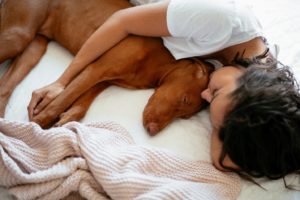
A survey conducted by the American Veterinary Medical Association found that roughly one-third of U.S. homes have a dog, while about one-quarter have a cat. There is no doubt that, as a culture, we place a high value on our furry friends! Many people even invite their pet into their bedroom at night — they may even share the same bed. If you choose to sleep with your four-legged companion, you should be aware of how their presence might affect the quality and quantity of your rest. In this article, we will discuss some potential benefits of sleeping with your pet, as well as the possible negative relationship between pets and sleep apnea in Fort Worth.
Pets and Sleep
A study by the Mayo Clinic set out to learn how dogs affect human sleep. All of the participants were healthy and had not been diagnosed with any sleep disorders. The study found that the people enjoyed the best sleep when they shared a bed with a human partner and a medium-sized dog was in the room, but not on their bed.
Additionally, the study uncovered that sharing a bed with a dog can adversely affect sleep efficiency, which is a ratio that compares time spent in bed with time asleep. Fortunately, the disruption was not severe for most people.
Other research suggests that even though pets can disrupt sleep, they often provide a relaxing sense of warmth and security. This may be especially beneficial for children as well as for adults who do not sleep with a human partner.
What if You Have Sleep Apnea?
Obstructive sleep apnea is a disorder marked by repeated pauses in breathing throughout the night. It occurs when tissues in the throat block the free flow of oxygen in the upper airway. Without proper management, it can cause serious health consequences.
Unfortunately, it is not usually a good idea for people with obstructive sleep apnea (OSA) to share a bedroom with their cat or dog. Your pet’s movements, combined with sleep disruptions caused by your disorder, can contribute to restless nights. Additionally, if you have any sort of allergies to pet dander, sleeping with an animal may cause respiratory symptoms that further affect the quantity and quality of your sleep.
Of course, if you are already getting treated for OSA, you might find that your pet’s presence in the bedroom has minimal impact on your condition. An oral sleep appliance may be the ideal type of treatment for pet owners because, unlike a CPAP machine, oral appliances are free of hoses and wires that a pet might chew on or trip on.
Should you sleep with your pet? That is a personal decision. The information in this article can help you decide whether to invite your furry friend into your bedroom.
Meet the Practice
Dr. Mitch Conditt spent the initial decades of his career as a general dentist, but in recent years, his focus has shifted to helping people find freedom from obstructive sleep apnea. If you have questions about this disorder and how to manage it, he and our team would be pleased to serve you. Contact us at 817-527-8500.
